Catch a Fire
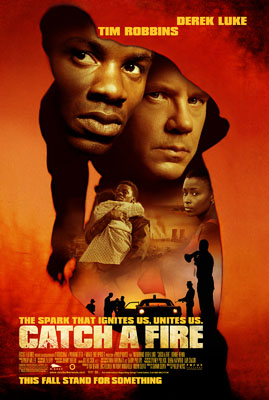
The question of what is the difference between a "terrorist" and a "freedom fighter" is one that has been asked many times during our current war situation. It is also one of the questions at the core of Catch a Fire. Set in 1980 Apartheid-era South Africa, the film follows a man's journey from casual on looker to someone who becomes involved, and is labeled as both a threat and a hero by the different people around him. Who is right, it is hard to say. Director Phillip Noyce (Patriot Games) and screenwriter Shawn Slovo (Captain Corelli's Mandolin) wisely look at the story from both sides, so that there are no true heroes or villains. The characters on both sides are fighting for what they believe in, and we the audience are left to our own devices to decide who is right in the end.
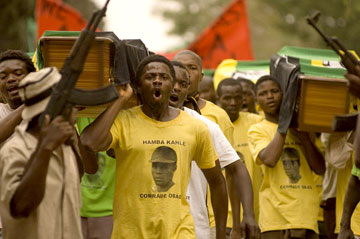 As the story opens, Patrick Chamusso (Derek Luke from Antwone Fisher and Friday Night Lights) is a man who chooses to ignore the rebellion going on around him in South Africa, mostly to protect himself and his family. He has a good job as an oil refinery foreman, a sympathetic wife (Bonnie Henna) and two young daughters. His life takes a drastic turn when some extremists set off a bomb at his refinery. Patrick is arrested and brought in for questioning by an investigator named Nic Vos (Tim Robbins). Because Patrick was visiting a woman that he's been having a secret affair with the night of the explosion, he is forced to lie, and his story of where he was at the time does not check out. The investigators continue to push harder for a confession, going so far as to also detain and torture Patrick's wife and some of his co-workers. Patrick is eventually set free, as the forced confession he gives to save his wife does not match how the perpetrators broke into the refinery, but he is obviously changed forever by his experience in captivity. Feeling he can no longer sit on the side lines and pretend his country and his people are not in turmoil, Patrick leaves everything behind to join a rebel group fighting for liberation, and slowly starts to become what Nic Vos initially wrongfully accused him of being.
As the story opens, Patrick Chamusso (Derek Luke from Antwone Fisher and Friday Night Lights) is a man who chooses to ignore the rebellion going on around him in South Africa, mostly to protect himself and his family. He has a good job as an oil refinery foreman, a sympathetic wife (Bonnie Henna) and two young daughters. His life takes a drastic turn when some extremists set off a bomb at his refinery. Patrick is arrested and brought in for questioning by an investigator named Nic Vos (Tim Robbins). Because Patrick was visiting a woman that he's been having a secret affair with the night of the explosion, he is forced to lie, and his story of where he was at the time does not check out. The investigators continue to push harder for a confession, going so far as to also detain and torture Patrick's wife and some of his co-workers. Patrick is eventually set free, as the forced confession he gives to save his wife does not match how the perpetrators broke into the refinery, but he is obviously changed forever by his experience in captivity. Feeling he can no longer sit on the side lines and pretend his country and his people are not in turmoil, Patrick leaves everything behind to join a rebel group fighting for liberation, and slowly starts to become what Nic Vos initially wrongfully accused him of being.
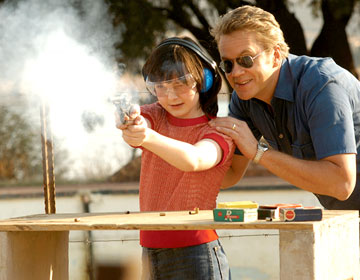 For the first hour or so, Catch a Fire is an intelligent and thrilling drama about a man being pushed to extremes. Although it never quite falls apart, the more action and suspense-filled second half does not have quite the emotional intensity of the first. Still, what we have here is a fine film that explores both sides of a very tricky issue. When we first meet Patrick, he is a man with a good life, though he seems to be taking a large risk with his occasional meetings with the woman in his life, who just happens to have a son that they both secretly share. Despite his secret life, he is a man who does not want to rock the boat. He is polite and courteous to the superiors that his fellow black Africans are rebelling against, simply because he wants to protect himself and his family. Some of his co-workers accuse him of being an "Uncle Tom" because of his overly gracious behavior around those who obviously do not respect him in the least, but he believes things will be better if he just pretends there is no problem in his homeland. When he is arrested and sees the cruelty of his captors first hand, his rage builds to a point that he no longer cares what happens to him. We watch his rage build to such a boiling point that he is able to give up his family in order to join the underground army of radicals. Patrick is a clearly defined character whose personality makes a visible change during the course of the film. A lot of this has to do with the award-worthy performance of Derek Luke, who is able to bring about the right amount of quiet desperation and visible rage that the character needs. Luke is able to show the shift in personality in a subtle and masterful performance that wisely knows how to draw the audience into the character without resorting to melodramatics or bellowing line reading like a lesser actor would handle the role.
For the first hour or so, Catch a Fire is an intelligent and thrilling drama about a man being pushed to extremes. Although it never quite falls apart, the more action and suspense-filled second half does not have quite the emotional intensity of the first. Still, what we have here is a fine film that explores both sides of a very tricky issue. When we first meet Patrick, he is a man with a good life, though he seems to be taking a large risk with his occasional meetings with the woman in his life, who just happens to have a son that they both secretly share. Despite his secret life, he is a man who does not want to rock the boat. He is polite and courteous to the superiors that his fellow black Africans are rebelling against, simply because he wants to protect himself and his family. Some of his co-workers accuse him of being an "Uncle Tom" because of his overly gracious behavior around those who obviously do not respect him in the least, but he believes things will be better if he just pretends there is no problem in his homeland. When he is arrested and sees the cruelty of his captors first hand, his rage builds to a point that he no longer cares what happens to him. We watch his rage build to such a boiling point that he is able to give up his family in order to join the underground army of radicals. Patrick is a clearly defined character whose personality makes a visible change during the course of the film. A lot of this has to do with the award-worthy performance of Derek Luke, who is able to bring about the right amount of quiet desperation and visible rage that the character needs. Luke is able to show the shift in personality in a subtle and masterful performance that wisely knows how to draw the audience into the character without resorting to melodramatics or bellowing line reading like a lesser actor would handle the role.
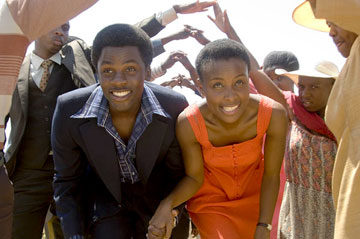 Equally commendable is the character of Nic Vos, both in the way he has been written, and in the performance of Tim Robbins. Even though the story is told from Patrick's point of view mostly, the screenplay is wise not to vilify or demonize the character of his main opponent. Nic Vos is a family man, and is not only doing his job, but is also trying to do whatever it takes to protect his teenage daughters who are stuck in a very hostile land. He seems to be the most rational of the men who question Patrick during his prison term, and he is also the one to see through the forced confession that Patrick is made to give. Although he performs some terrible actions during the film, we get the sense that Nic is only doing it to protect himself and those that he loves, making him almost sympathetic at times. The screenplay is able to handle the tricky balance of the character of not making him completely unlikeable, while also not making him misunderstood. He knows what he's doing, and he's doing it because he feels he is right. The performance from Tim Robbins is just as good as Luke's, as not only does he perform a near flawless accent for his character, but his is able to make Nic Vos into a three dimensional and interesting character who intrigues us. It's almost a shame that Robbins and Luke have so few scenes together, as they play off against each other well with their very different roles and motivations.
Equally commendable is the character of Nic Vos, both in the way he has been written, and in the performance of Tim Robbins. Even though the story is told from Patrick's point of view mostly, the screenplay is wise not to vilify or demonize the character of his main opponent. Nic Vos is a family man, and is not only doing his job, but is also trying to do whatever it takes to protect his teenage daughters who are stuck in a very hostile land. He seems to be the most rational of the men who question Patrick during his prison term, and he is also the one to see through the forced confession that Patrick is made to give. Although he performs some terrible actions during the film, we get the sense that Nic is only doing it to protect himself and those that he loves, making him almost sympathetic at times. The screenplay is able to handle the tricky balance of the character of not making him completely unlikeable, while also not making him misunderstood. He knows what he's doing, and he's doing it because he feels he is right. The performance from Tim Robbins is just as good as Luke's, as not only does he perform a near flawless accent for his character, but his is able to make Nic Vos into a three dimensional and interesting character who intrigues us. It's almost a shame that Robbins and Luke have so few scenes together, as they play off against each other well with their very different roles and motivations.
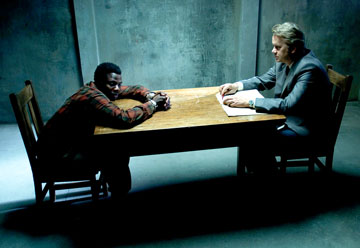 Outside of the two leads, the main stand out is Bonnie Henna who brings a certain kind of quiet dignity as Precious, Patrick's wife. She has her suspicions about her husband's actions and thoughts, and tries her best to support him for as long as she can. Although her role is somewhat minor, she is a powerful presence in just about every scene she's in, saying so much simply with her expressful face and eyes, often without saying a word. All of the major characters are so fascinating that it almost feels like a cop out when the movie becomes a standard "race against the clock" thriller during the later half. It's not enough to ruin the film, but one wonders just how much the movie could have been if it had stuck with the powerful human drama of the first hour or so before it turns to shootouts and chase scenes. The film's very last final moments before the end credits also feel a bit tacked on, as if the studio was desperate to add some hope at the end of a somewhat sad story, but they at least give us a rare glimpse into the life of the actual Patrick Chamusso. Other noteworthy elements of the film include the cinematography by Garry Phillips, which uses the South African landscape and cities to great effect in order to showcase the different lives of the two men who drive the story, and the soundtrack that features a number of stirring songs of rebellion in many scenes.
Outside of the two leads, the main stand out is Bonnie Henna who brings a certain kind of quiet dignity as Precious, Patrick's wife. She has her suspicions about her husband's actions and thoughts, and tries her best to support him for as long as she can. Although her role is somewhat minor, she is a powerful presence in just about every scene she's in, saying so much simply with her expressful face and eyes, often without saying a word. All of the major characters are so fascinating that it almost feels like a cop out when the movie becomes a standard "race against the clock" thriller during the later half. It's not enough to ruin the film, but one wonders just how much the movie could have been if it had stuck with the powerful human drama of the first hour or so before it turns to shootouts and chase scenes. The film's very last final moments before the end credits also feel a bit tacked on, as if the studio was desperate to add some hope at the end of a somewhat sad story, but they at least give us a rare glimpse into the life of the actual Patrick Chamusso. Other noteworthy elements of the film include the cinematography by Garry Phillips, which uses the South African landscape and cities to great effect in order to showcase the different lives of the two men who drive the story, and the soundtrack that features a number of stirring songs of rebellion in many scenes.
 As the story opens, Patrick Chamusso (Derek Luke from Antwone Fisher and Friday Night Lights) is a man who chooses to ignore the rebellion going on around him in South Africa, mostly to protect himself and his family. He has a good job as an oil refinery foreman, a sympathetic wife (Bonnie Henna) and two young daughters. His life takes a drastic turn when some extremists set off a bomb at his refinery. Patrick is arrested and brought in for questioning by an investigator named Nic Vos (Tim Robbins). Because Patrick was visiting a woman that he's been having a secret affair with the night of the explosion, he is forced to lie, and his story of where he was at the time does not check out. The investigators continue to push harder for a confession, going so far as to also detain and torture Patrick's wife and some of his co-workers. Patrick is eventually set free, as the forced confession he gives to save his wife does not match how the perpetrators broke into the refinery, but he is obviously changed forever by his experience in captivity. Feeling he can no longer sit on the side lines and pretend his country and his people are not in turmoil, Patrick leaves everything behind to join a rebel group fighting for liberation, and slowly starts to become what Nic Vos initially wrongfully accused him of being.
As the story opens, Patrick Chamusso (Derek Luke from Antwone Fisher and Friday Night Lights) is a man who chooses to ignore the rebellion going on around him in South Africa, mostly to protect himself and his family. He has a good job as an oil refinery foreman, a sympathetic wife (Bonnie Henna) and two young daughters. His life takes a drastic turn when some extremists set off a bomb at his refinery. Patrick is arrested and brought in for questioning by an investigator named Nic Vos (Tim Robbins). Because Patrick was visiting a woman that he's been having a secret affair with the night of the explosion, he is forced to lie, and his story of where he was at the time does not check out. The investigators continue to push harder for a confession, going so far as to also detain and torture Patrick's wife and some of his co-workers. Patrick is eventually set free, as the forced confession he gives to save his wife does not match how the perpetrators broke into the refinery, but he is obviously changed forever by his experience in captivity. Feeling he can no longer sit on the side lines and pretend his country and his people are not in turmoil, Patrick leaves everything behind to join a rebel group fighting for liberation, and slowly starts to become what Nic Vos initially wrongfully accused him of being. For the first hour or so, Catch a Fire is an intelligent and thrilling drama about a man being pushed to extremes. Although it never quite falls apart, the more action and suspense-filled second half does not have quite the emotional intensity of the first. Still, what we have here is a fine film that explores both sides of a very tricky issue. When we first meet Patrick, he is a man with a good life, though he seems to be taking a large risk with his occasional meetings with the woman in his life, who just happens to have a son that they both secretly share. Despite his secret life, he is a man who does not want to rock the boat. He is polite and courteous to the superiors that his fellow black Africans are rebelling against, simply because he wants to protect himself and his family. Some of his co-workers accuse him of being an "Uncle Tom" because of his overly gracious behavior around those who obviously do not respect him in the least, but he believes things will be better if he just pretends there is no problem in his homeland. When he is arrested and sees the cruelty of his captors first hand, his rage builds to a point that he no longer cares what happens to him. We watch his rage build to such a boiling point that he is able to give up his family in order to join the underground army of radicals. Patrick is a clearly defined character whose personality makes a visible change during the course of the film. A lot of this has to do with the award-worthy performance of Derek Luke, who is able to bring about the right amount of quiet desperation and visible rage that the character needs. Luke is able to show the shift in personality in a subtle and masterful performance that wisely knows how to draw the audience into the character without resorting to melodramatics or bellowing line reading like a lesser actor would handle the role.
For the first hour or so, Catch a Fire is an intelligent and thrilling drama about a man being pushed to extremes. Although it never quite falls apart, the more action and suspense-filled second half does not have quite the emotional intensity of the first. Still, what we have here is a fine film that explores both sides of a very tricky issue. When we first meet Patrick, he is a man with a good life, though he seems to be taking a large risk with his occasional meetings with the woman in his life, who just happens to have a son that they both secretly share. Despite his secret life, he is a man who does not want to rock the boat. He is polite and courteous to the superiors that his fellow black Africans are rebelling against, simply because he wants to protect himself and his family. Some of his co-workers accuse him of being an "Uncle Tom" because of his overly gracious behavior around those who obviously do not respect him in the least, but he believes things will be better if he just pretends there is no problem in his homeland. When he is arrested and sees the cruelty of his captors first hand, his rage builds to a point that he no longer cares what happens to him. We watch his rage build to such a boiling point that he is able to give up his family in order to join the underground army of radicals. Patrick is a clearly defined character whose personality makes a visible change during the course of the film. A lot of this has to do with the award-worthy performance of Derek Luke, who is able to bring about the right amount of quiet desperation and visible rage that the character needs. Luke is able to show the shift in personality in a subtle and masterful performance that wisely knows how to draw the audience into the character without resorting to melodramatics or bellowing line reading like a lesser actor would handle the role. Equally commendable is the character of Nic Vos, both in the way he has been written, and in the performance of Tim Robbins. Even though the story is told from Patrick's point of view mostly, the screenplay is wise not to vilify or demonize the character of his main opponent. Nic Vos is a family man, and is not only doing his job, but is also trying to do whatever it takes to protect his teenage daughters who are stuck in a very hostile land. He seems to be the most rational of the men who question Patrick during his prison term, and he is also the one to see through the forced confession that Patrick is made to give. Although he performs some terrible actions during the film, we get the sense that Nic is only doing it to protect himself and those that he loves, making him almost sympathetic at times. The screenplay is able to handle the tricky balance of the character of not making him completely unlikeable, while also not making him misunderstood. He knows what he's doing, and he's doing it because he feels he is right. The performance from Tim Robbins is just as good as Luke's, as not only does he perform a near flawless accent for his character, but his is able to make Nic Vos into a three dimensional and interesting character who intrigues us. It's almost a shame that Robbins and Luke have so few scenes together, as they play off against each other well with their very different roles and motivations.
Equally commendable is the character of Nic Vos, both in the way he has been written, and in the performance of Tim Robbins. Even though the story is told from Patrick's point of view mostly, the screenplay is wise not to vilify or demonize the character of his main opponent. Nic Vos is a family man, and is not only doing his job, but is also trying to do whatever it takes to protect his teenage daughters who are stuck in a very hostile land. He seems to be the most rational of the men who question Patrick during his prison term, and he is also the one to see through the forced confession that Patrick is made to give. Although he performs some terrible actions during the film, we get the sense that Nic is only doing it to protect himself and those that he loves, making him almost sympathetic at times. The screenplay is able to handle the tricky balance of the character of not making him completely unlikeable, while also not making him misunderstood. He knows what he's doing, and he's doing it because he feels he is right. The performance from Tim Robbins is just as good as Luke's, as not only does he perform a near flawless accent for his character, but his is able to make Nic Vos into a three dimensional and interesting character who intrigues us. It's almost a shame that Robbins and Luke have so few scenes together, as they play off against each other well with their very different roles and motivations. Outside of the two leads, the main stand out is Bonnie Henna who brings a certain kind of quiet dignity as Precious, Patrick's wife. She has her suspicions about her husband's actions and thoughts, and tries her best to support him for as long as she can. Although her role is somewhat minor, she is a powerful presence in just about every scene she's in, saying so much simply with her expressful face and eyes, often without saying a word. All of the major characters are so fascinating that it almost feels like a cop out when the movie becomes a standard "race against the clock" thriller during the later half. It's not enough to ruin the film, but one wonders just how much the movie could have been if it had stuck with the powerful human drama of the first hour or so before it turns to shootouts and chase scenes. The film's very last final moments before the end credits also feel a bit tacked on, as if the studio was desperate to add some hope at the end of a somewhat sad story, but they at least give us a rare glimpse into the life of the actual Patrick Chamusso. Other noteworthy elements of the film include the cinematography by Garry Phillips, which uses the South African landscape and cities to great effect in order to showcase the different lives of the two men who drive the story, and the soundtrack that features a number of stirring songs of rebellion in many scenes.
Outside of the two leads, the main stand out is Bonnie Henna who brings a certain kind of quiet dignity as Precious, Patrick's wife. She has her suspicions about her husband's actions and thoughts, and tries her best to support him for as long as she can. Although her role is somewhat minor, she is a powerful presence in just about every scene she's in, saying so much simply with her expressful face and eyes, often without saying a word. All of the major characters are so fascinating that it almost feels like a cop out when the movie becomes a standard "race against the clock" thriller during the later half. It's not enough to ruin the film, but one wonders just how much the movie could have been if it had stuck with the powerful human drama of the first hour or so before it turns to shootouts and chase scenes. The film's very last final moments before the end credits also feel a bit tacked on, as if the studio was desperate to add some hope at the end of a somewhat sad story, but they at least give us a rare glimpse into the life of the actual Patrick Chamusso. Other noteworthy elements of the film include the cinematography by Garry Phillips, which uses the South African landscape and cities to great effect in order to showcase the different lives of the two men who drive the story, and the soundtrack that features a number of stirring songs of rebellion in many scenes.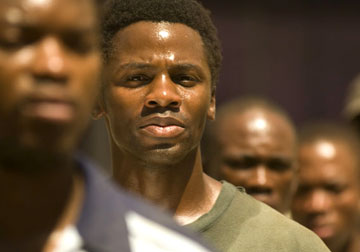
By the time Catch a Fire is over, the question of what constitutes a terrorist or a freedom fighter is left undetermined, and quite frankly, I think that's the way it should be. Everyone in this movie fights for their own beliefs, and we are simply along for the ride, observing all sides. That it leaves its own question somewhat up to debate is a bold move on the part of the filmmakers, and one that is sure to inspire conversation from anyone who decides to see this film. There have been a lot of films released lately about turmoil in Africa such as The Constant Gardener and The Last King of Scotland, but of those films, this is the first one to actually look at the situation mostly through the eyes of an African. Catch a Fire makes a lot of right moves, and although it's not quite perfect, it still manages to stick with the viewer long after the end credits have wound down.
See the movie times in your area or buy the DVD at Amazon.com!






0 Comments:
Post a Comment
<< Home